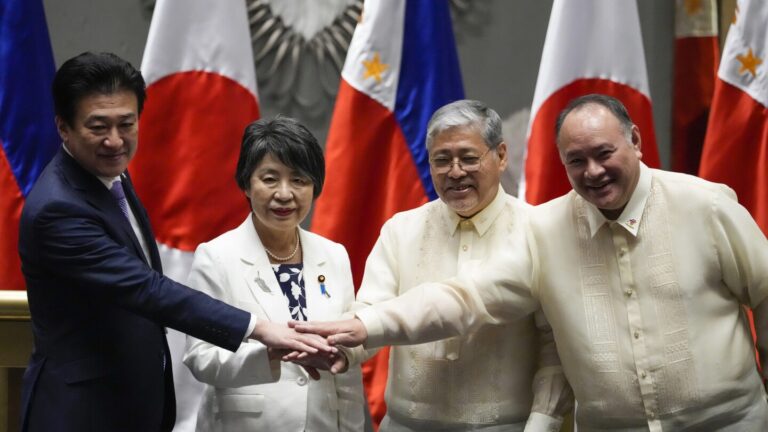MANILA, Philippines (AP) — Japan and the Philippines Important defense agreement Japan on Monday gave the go-ahead for the deployment of Japanese troops for joint military exercises in the Southeast Asian country, which was brutally occupied by Japan during World War II but is now building an alliance with Japan amid a growing conflict with China.
of Mutual Access AgreementThe treaty, which also allows Philippine troops to enter Japan for joint combat training, was signed in Manila by Philippine Defense Secretary Gilberto Teodoro and Japanese Foreign Minister Yoko Kamikawa and witnessed by President Ferdinand Marcos Jr. The treaty will take effect after ratification by the parliaments of both countries, according to Philippine and Japanese officials.
Kamikawa called the signing a “groundbreaking achievement” and said it should further boost defense cooperation between the two countries.
Officials from Japan and the Philippines “expressed serious concern over China’s dangerous and escalating actions” at Second Thomas Shoal, the site of a recent clash between Chinese and Philippine forces in the South China Sea, a vital global trade route over which China claims virtually the entirety. But the controversy The Philippines, Vietnam, Malaysia, Brunei and Taiwan are also participating in part.
In their joint statement, they stressed the need for the international community to “speak out on the importance of maintaining and strengthening a free and open international order based on the rule of law” in the disputed waters.
In Beijing, Foreign Ministry spokesman Lin Jian said “the Asia-Pacific region does not need military blocs, much less small groups that foment conflict between blocs and a new Cold War,” and reminded Japan of atrocities it committed in Southeast Asian countries, including the Philippines, during World War II.
“Japan should seriously reflect on its history of aggression and act with prudence in the field of military security,” the spokesman said.
The defense agreement with the Philippines, which includes live-fire exercises, is Japan’s first with an Asian country. Japan has a similar agreement with the Philippines. Australia in 2022 and With the UK in 2023.
Under the leadership of Prime Minister Fumio Kishida, Japan Strengthening security and defense capabilitiesThis includes a counterattack capability, breaking with the postwar principle of focusing solely on self-defense. Japan plans to double its defense spending over the next five years to 2027, strengthening its military and making it the world’s third-largest military spender after the United States and China.
Many of Japan’s Asian neighbors, including the Philippines, were invaded by Japan until its defeat in World War II, and Japan’s efforts to strengthen its military role and spending have A delicate issueHowever, Japan and the Philippines have steadily deepened their defense and security ties.
Kishida’s move dovetails with President Marcos’ efforts to build a security alliance to bolster the Philippine military’s limited ability to defend its interests in the South China Sea.
The United States is also working to strengthen its military alliances in the Indo-Pacific to counter China and reassure Asian allies, including in a future conflict over Taiwan. Japan and the Philippines are U.S. treaty allies, and their leaders met at the White House in April, when President Joe Biden said he would not allow the two nations to compete. Washington’s “Ironclad” Resolve To protect Japan and the Philippines.
Japan has been Territorial dispute with China Chinese and Philippine coast guard and naval vessels have been involved in a series of tense clashes in the South China Sea since last year over islands in the East China Sea.
In The worst conflict So far, China Coast Guard personnel armed with knives, spears and axes have been involved in chaotic clashes on June 17 when they repeatedly rammed and destroyed two Philippine Navy supply ships in a motorboat, injuring several Filipino sailors at the disputed Second Thomas Shoal. China Coast Guard personnel have confiscated seven navy rifles.
Japanese and Philippine officials said China’s actions at the reef had “impeded freedom of navigation, disrupted supply routes and increased tensions.”
“Japan is firmly opposed to the dangerous and coercive use of coast guard and maritime militia vessels,” Foreign Minister Kihara said at a press conference.
The Philippines strongly protested the China Coast Guard’s actions and demanded $1 million in compensation and the return of the rifle. China accused the Philippines of inciting violence and claimed the Filipino sailors strayed into Chinese waters despite warnings.
Japan and the United States have been the first to express concern over China’s actions and urged Beijing to abide by international law. The United States is obligated to defend the Philippines, Asia’s oldest treaty ally, if Philippine troops, ships or aircraft come under attack in the South China Sea or elsewhere.
___
Nuga reported from Bangkok. Associated Press writers Joel Carpitan and Aaron Favila in Manila, Philippines, contributed to this report.

